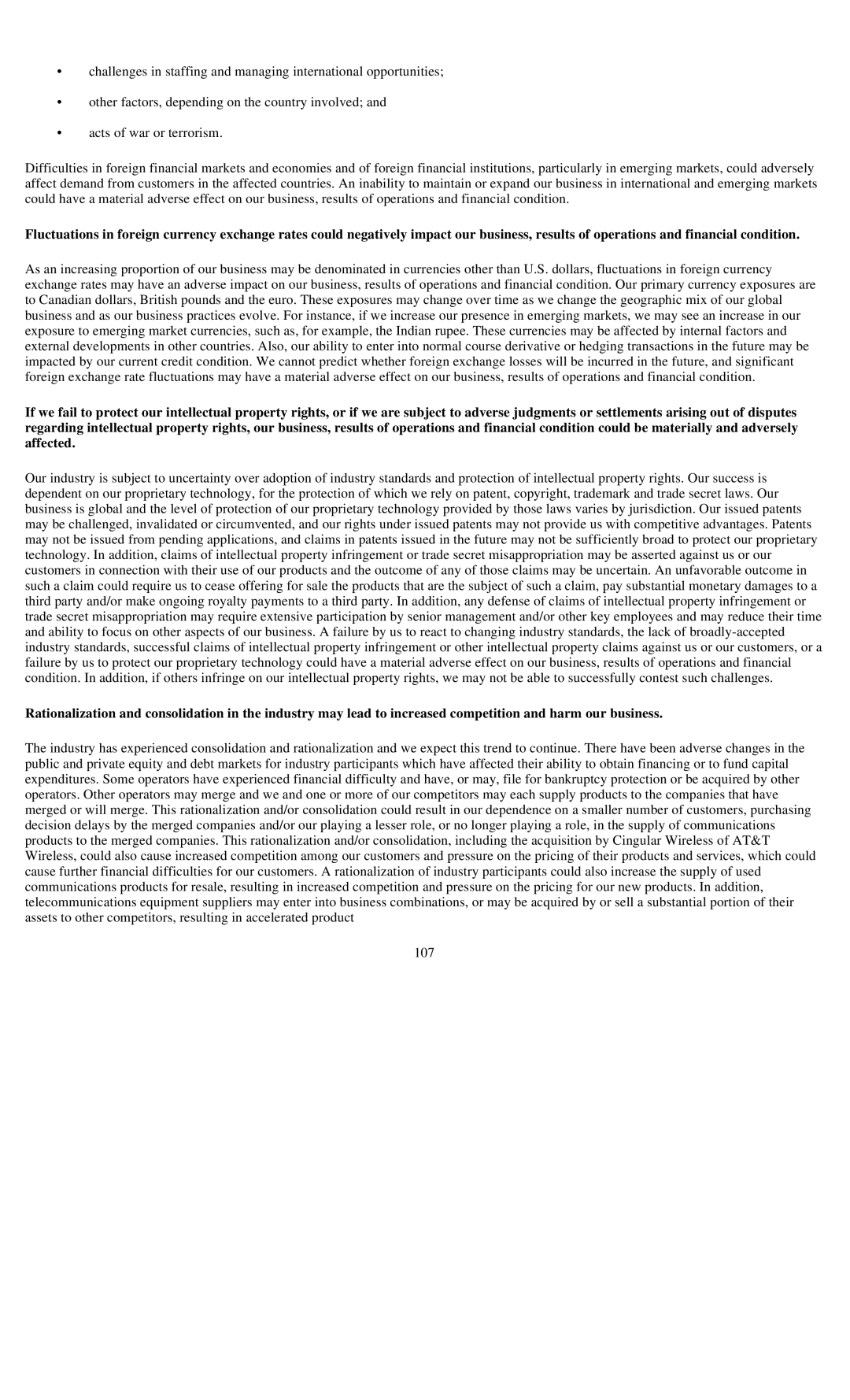•challenges in staffing and managing international opportunities;
•other factors, depending on the country involved; and
•acts of war or terrorism.
Difficulties in foreign financial markets and economies and of foreign financial institutions, particularly in emerging markets, could adversely affect demand from customers in the affected countries. An inability to maintain or expand our business in international and emerging markets could have a material adverse effect on our business, results of operations and financial condition.
Fluctuations in foreign currency exchange rates could negatively impact our business, results of operations and financial condition.
As an increasing proportion of our business may be denominated in currencies other than U.S. dollars, fluctuations in foreign currency exchange rates may have an adverse impact on our business, results of operations and financial condition. Our primary currency exposures are to Canadian dollars, British pounds and the euro. These exposures may change over time as we change the geographic mix of our global business and as our business practices evolve. For instance, if we increase our presence in emerging markets, we may see an increase in our exposure to emerging market currencies, such as, for example, the Indian rupee. These currencies may be affected by internal factors and external developments in other countries. Also, our ability to enter into normal course derivative or hedging transactions in the future may be impacted by our current credit condition. We cannot predict whether foreign exchange losses will be incurred in the future, and significant foreign exchange rate fluctuations may have a material adverse effect on our business, results of operations and financial condition.
If we fail to protect our intellectual property rights, or if we are subject to adverse judgments or settlements arising out of disputes regarding intellectual property rights, our business, results of operations and financial condition could be materially and adversely affected.
Our industry is subject to uncertainty over adoption of industry standards and protection of intellectual property rights. Our success is dependent on our proprietary technology, for the protection of which we rely on patent, copyright, trademark and trade secret laws. Our business is global and the level of protection of our proprietary technology provided by those laws varies by jurisdiction. Our issued patents may be challenged, invalidated or circumvented, and our rights under issued patents may not provide us with competitive advantages. Patents may not be issued from pending applications, and claims in patents issued in the future may not be sufficiently broad to protect our proprietary technology. In addition, claims of intellectual property infringement or trade secret misappropriation may be asserted against us or our customers in connection with their use of our products and the outcome of any of those claims may be uncertain. An unfavorable outcome in such a claim could require us to cease offering for sale the products that are the subject of such a claim, pay substantial monetary damages to a third party and/or make ongoing royalty payments to a third party. In addition, any defense of claims of intellectual property infringement or trade secret misappropriation may require extensive participation by senior management and/or other key employees and may reduce their time and ability to focus on other aspects of our business. A failure by us to react to changing industry standards, the lack of
Rationalization and consolidation in the industry may lead to increased competition and harm our business.
The industry has experienced consolidation and rationalization and we expect this trend to continue. There have been adverse changes in the public and private equity and debt markets for industry participants which have affected their ability to obtain financing or to fund capital expenditures. Some operators have experienced financial difficulty and have, or may, file for bankruptcy protection or be acquired by other operators. Other operators may merge and we and one or more of our competitors may each supply products to the companies that have merged or will merge. This rationalization and/or consolidation could result in our dependence on a smaller number of customers, purchasing decision delays by the merged companies and/or our playing a lesser role, or no longer playing a role, in the supply of communications products to the merged companies. This rationalization and/or consolidation, including the acquisition by Cingular Wireless of AT&T Wireless, could also cause increased competition among our customers and pressure on the pricing of their products and services, which could cause further financial difficulties for our customers. A rationalization of industry participants could also increase the supply of used communications products for resale, resulting in increased competition and pressure on the pricing for our new products. In addition, telecommunications equipment suppliers may enter into business combinations, or may be acquired by or sell a substantial portion of their assets to other competitors, resulting in accelerated product
107
